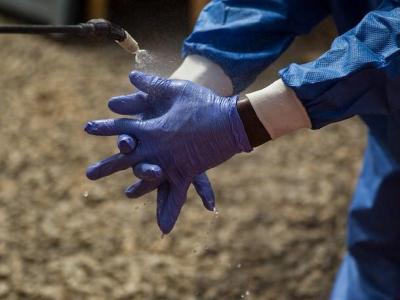Jan 30, 2009 (CIDRAP News) – The US Food and Drug Administration said today it is starting a criminal investigation of Peanut Corp. of America (PCA), the company whose peanut processing plant in Georgia has been linked with a Salmonella outbreak involving more than 500 cases nationwide.
The FDA announcement came amid a flurry of other developments related to the outbreak:
- The FDA said a shipment of chopped peanuts from the PCA facility in Blakely, Ga., was rejected by Canada last April because it contained metal fragments, which led to an inspection of the facility in June.
- The US House Energy and Commerce Committee announced plans to hold a hearing on the outbreak on Feb 11.
- The Centers for Disease Control and Prevention (CDC) today said the case count in the outbreak has risen to 529 in 43 states, an increase of 28 since the last official count on Jan 25.
- The FDA said "boutique brands" of peanut butter could be contaminated if they contain PCA peanuts, though it continued to say there is no evidence that any national peanut butter brands in retail stores are contaminated.
Criminal investigation
"I can confirm that the FDA Office of Criminal Investigation is involved with the Justice Department in an investigation of Peanut Corp. of America," Stephen Sundlof, DVM, head of the FDA's Center for Food Safety and Applied Nutrition (CFSAN), said at a press teleconference this afternoon.
"It's an open investigation at this time and we can't talk at all about the investigation," he said.
The announcement comes 3 days after the FDA first reported that PCA had sold peanut products that had initially tested positive for Salmonella. In an inspection report published on Jan 28, the FDA said that in 12 cases over the past 18 months, initial tests had detected Salmonella in various PCA peanut products. In each case the company had the product retested and then sold it after the second test was negative, according to the FDA.
In a Jan 28 statement, the company said, "PCA uses only two highly reputable labs for product testing and they are widely used by the industry and employ good manufacturing practices. PCA categorically denies any allegations that the company sought favorable results from any lab in order to ship its products."
The company also said that during the FDA's recent 2-week investigation of the Blakely plant, the company took corrective action "where possible." The firm added, "PCA does not agree with all the observations noted [in the FDA report], and there are some inaccuracies."
The FDA's investigation prompted PCA this week to expand its previous product recall to cover all products produced at the Blakely plant since Jan 1, 2007. The recall covers oil-roasted and dry-roasted peanuts, granulated peanuts, peanut meal, peanut butter, and peanut paste.
The company sells peanut butter to institutions and food service operations but not retail stores. It also sells peanut products to food companies for processing into a variety of other products, such as crackers, cookies, candy, ice cream, and pet food. The CDC said today that 54 companies using PCA ingredients had recalled at least 431 products containing peanut butter as of Jan 28.
Sundlof today repeated the advice to consumers to check the FDA Web site (see link below) to learn what products have been recalled or will be recalled in coming days. Consumers can also call a CDC hotline at 1-800-CDC-INFO or check manufacturer Web sites or phone lines as listed on product labels.
Metal found in chopped peanuts
An Associated Press (AP) report published today prompted Sundlof's revelation of the PCA shipment of chopped peanuts that was rejected by Canada because it contained metal fragments.
"It turned out that the peanuts had metal fragments in them, and under FDA instructions, PCA destroyed it so it couldn't enter commerce," Sundlof said. "FDA inspected the facility so it couldn't happen again."
The AP story said an FDA report had said the peanuts contained a "filthy, putrid or decomposed substance, or is otherwise unfit for food." Today FDA officials said that's the official language the agency uses when food is contaminated with metal fragments.
Domenic Veneziano, director of import operations in the FDA Office of Regulatory Affairs, said the tainted product was shipped back to the PCA facility on Apr 11, 2008. "They tried to recondition and clean up the shipment and it couldn't be done," he said. "As a result, working with FDA it was decided it was best to destroy the product," which was done on Nov 17.
In response to questions, Veneziano said the episode led to an inspection of the Blakely plant by Georgia officials on Jun 10, 2008. He said the inspectors did not look at "other issues" besides those raised by that specific contaminated shipment.
House committee hearing set
Rep. Henry A. Waxman, D-Calif., and Rep. Bart Stupak, D-Mich., today announced their plan to hold a hearing on the Salmonella outbreak on Feb 11. Waxman is chairman of the Energy and Commerce Committee, while Stupak chairs the Oversight and Investigations Subcommittee.
In a statement, the two Democrats said they are inviting officials from PCA, FDA, the Georgia Department of Agriculture, and two private laboratories: Deibel Labs Inc. and J Leek Associates Inc.
Waxman called the situation at the PCA facility "alarming," adding, "It shows major gaps in our food safety system."
Charles Deibel of Deibel Labs told Congress yesterday that his lab occasionally did some testing for PCA, according to an AP report published today. Deibel said his lab tested some Salmonella cultures that came from a J. Leek Associates facility to identify the speicifc strain present, according to the AP story.
J. Leek Associates, also known as JLA Global, has a lab in Blakely, Ga., according to the company web site.
Deibel testified that manufacturers "can't retest away a positive result," the AP reported.
Craig Hedberg, PhD, a foodborne disease expert at the University of Minnesota in Minneapolis, said today that Salmonella in a ready-to-eat product such as peanut butter is clearly an adulterant that makes the product unfit for consumption, but in peanut products to be used as ingredients in other foods, the situation may be less clear.
"If they identified Salmonella in their [peanut butter] product, it shouldn't have been shipped," he told CIDRAP News. "If they're arguing that the intitial [test] results were not valid for some reason, they have to justify why it's not valid."
But he added, "If it's chopped peanuts or peanut paste, an ingredient that going to be processed by someone else, it's probably not as clear-cut an issue whether that would be an adulterant or not, depending on whether the subsequent processing includes a 'kill' step."
Hedberg noted that Salmonella is a known risk with raw chicken, so food processors recognize they have to deal with it. However, "Peanut products don't fall in the category that we'd necessarily assume could be contaminated with Salmonella," he said. If there's a risk of contamination, the firm receiving the product should be warned so they can handle it properly, he added.
A heat-resistant pathogen
In a report today, the CDC said peanuts for peanut butter are usually roasted at 350°F, hot enough to quickly kill any Salmonella. But in high-fat, low-water foods like peanut butter, Salmonella can withstand temperatures as high as 194°F for 50 minutes, the agency said in today's issue of Morbidity and Mortality Weekly Report.
Given the organism's heat resistance, "some temperatures used in processing peanut butter or paste in other products might be inadequate to eliminate Salmonella introduced after the initial peanut roasting," the CDC said.
The CDC report, which gives a detailed account of the outbreak investigation, says 116 of the 529 people sickened in the outbreak were hospitalized, and the number of deaths possibly related to it remains at 8. The most recent known illness onset was Jan 16. Ohio has the most cases, with 72, followed by California with 68 and Minnesota with 36.
Investigators have found 16 case clusters (two or more cases), all of them in institutions that served King Nut peanut butter, one of the brands under which PCA peanut butter is sold, the report says.
The outbreak strain is actually two very closely related strains of Salmonella enterica serotype Typhimurium, the report notes. But it says an unopened container of King Nut peanut butter in Minnesota recently yielded Salmonella Tennessee that matched the strain in the multistate outbreak linked to ConAgra peanut butter in 2006-07. No increase in Salmonella Tennessee infections has been seen recently.
The plant implicated in the 2006-07 outbreak is about 70 miles from Blakely, the report says, adding, "The relationship of the S Tennessee finding to the current outbreak is being investigated further."
'Boutique brands' of peanut butter
In other comments at today's news briefing:
- Sundlof mentioned the possibility of contamination in "boutique brands" of peanut butter. "With the expanded recall covering dry and oil-roasted peanuts, we certainly recognize the possibility that those nuts may be purchased and ground by certain stores and boutiques into their own brand," though no national brands have been implicated, he said.
- With the expanded recall, roughly another 350 firms that bought products from PCA may be affected, in addition to 77 companies identified previously, said Jack Guzewich, deputy director of the Office of Food Defense Communication and Emergency Response at CFSAN.
- The FDA has inspected PCA facilities in Texas and Virginia and found no evidence of a connection to the outbreak, said the FDA's Michael Rogers.
See also:
FDA Salmonella outbreak update page
http://www.fda.gov/oc/opacom/hottopics/salmonellatyph.html
House Energy and Commerce committee release on hearings
http://democrats.energycommerce.house.gov/index.php?option=com_content&task=view&id=1482&Itemid=1
Jan 29 MMWR early release report on multistate Salmonella outbreak
http://www.cdc.gov/mmwr/preview/mmwrhtml/mm58e0129a1.htm














